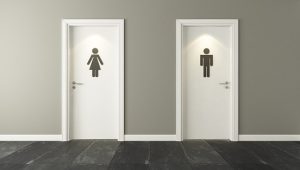
Other results from the survey uncovered that 86 percent of women have peed elsewhere than a bathroom – top places being bushes, the woods, roadside, the ocean, a parking lot, and unfortunately, their pants.
Thirty-nine percent of women admitted to not confiding about their bladder problems to someone else. So, with all this going on in the world, why aren’t we talking about it?
For starters, it seems that many of us take our bladder for granted as peeing is such a natural process. But our urinating habits can reveal a lot about our health. For example, peeing more than eight times a day – without increasing your fluid intake – is not normal and could be a symptom of an overactive bladder.
Overactive bladder (OAB) affects nearly 46 million Americans over the age of 40, with the majority of sufferers being women. Symptoms include frequent urge to urinate and even possible leakages. Unfortunately, many people consider this to be a “normal” part of aging, but it isn’t.
Here are a few tips to maintain a healthy bladder:
- Talk to your doctor about your daily habits to ensure you are living a life that promotes a healthy bladder
- Drink plenty of water to stay hydrated
- Maintain a balanced diet so you receive the necessary vitamins and nutrients you require to stay healthy
- Perform Kegel exercises regularly to strengthen your pelvic floor
- Be mindful of stimulants that can irritate your bladder like tobacco, coffee, alcohol, and spicy foods
You need to know that bladder problems aren’t a result of aging and that it’s perfectly okay to be open and discuss them. More often than not, there are many others that are suffering from the same problems as you. Instead of suffering in silence, reach out to others for support and get through it together.
Related: Causes of irritable bladder: Symptoms, treatment, and home remedies